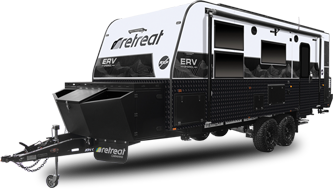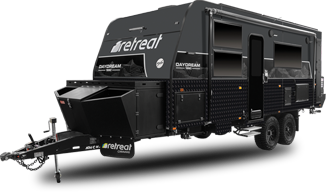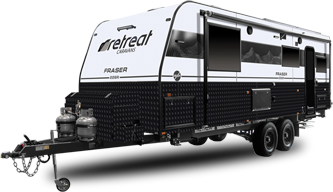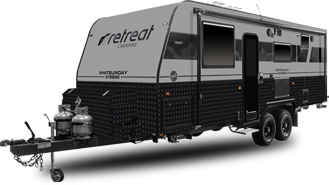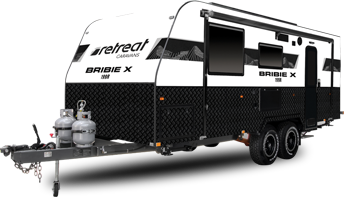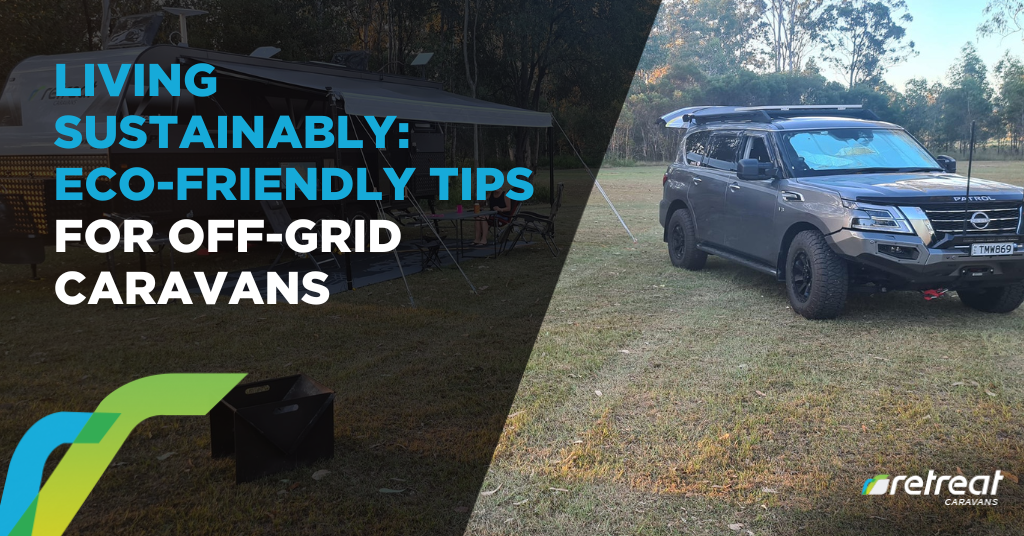
Living Sustainably: Eco-Friendly Tips for Off-Grid Caravaners
Hit the Road, Not the Planet
Australia’s remote beauty is unmatched. But it demands respect. Going off-grid in the bush means more than just unplugging—it’s about treading lightly and protecting the country you’re exploring.
Modern luxury caravans help make this easier, blending clever tech and eco-conscious design into comfortable, mobile homes. Whether you’re chasing coastline or camping beneath gum trees, the choices you make can help preserve the land for the next traveller.
1. Powering Up with the Sun
Electricity off-grid can be tricky, but with the right solar setup, it becomes simple and sustainable. Rooftop panels collect power, while lithium batteries store it for night use. The trick is knowing what uses power and how to make it go further.
Fitting your rig with energy-efficient gear like LED lights and 12V fridges means your solar lasts longer. Placement matters too—angled panels that follow the sun can boost performance. Keeping them clean also makes a noticeable difference.
Many off-grid caravans now come with solar-ready systems that make managing power use simple, helping you stay off the grid longer without relying on noisy generators.
2. Saving Water Like a Pro
Water is precious out bush. The key is making it stretch. Installing low-flow taps, water-saving showerheads and efficient plumbing helps you stay clean without draining your tanks too fast.
Eco-friendly soaps and shampoos reduce harm if greywater is tipped out in permitted areas. A few extra strategies—like reusing rinse water or wiping down dishes before washing—can save litres every day.
If you’re after more smart ideas to reduce your impact while travelling, these 10 eco-friendly ideas for your next camping trip offer practical tips you can use immediately.
3. Ditching Waste the Smart Way
Even on the road, waste builds up. What matters is how you handle it. Avoid single-use packaging by stocking bulk dry goods and using washable containers. Sort rubbish into recycling, general waste and compost where possible.
A composting bin can manage food scraps easily, especially with airtight models designed for vans. Avoid burying rubbish—even biodegradable waste can attract animals or damage the environment.
If you’re running a solar setup already, consider pairing it with low-energy appliances and filtered greywater systems to create a closed-loop system. That’s one way how off-grid solar solutions improve travel sustainability, turning your van into a self-sufficient hub.
4. Toilets That Don’t Trash the Planet
Eco toilets are a must if you’re travelling long-term. Chemical toilets might be common, but they come with environmental downsides. A composting toilet uses no water or harsh chemicals. It works with carbon materials—like sawdust—and natural airflow to break down waste.
These systems not only reduce smells, but they also let you camp longer without needing dump points. For smaller setups, dry toilets with sealed containers are a simple step up from chemical options.
Many people don’t realise just why off-grid caravans are changing the way we travel until they experience the freedom that comes from not relying on fixed services.
5. Eco-Friendly Materials and Fit-Outs
It’s not just what powers your caravan—it’s what it’s made of. Sustainable van builds now include low-VOC paints, recycled fittings and insulation made from natural wool or repurposed fibres.
Choosing bamboo benches, wooden storage, and organic cotton for soft furnishings lowers the chemical load inside your caravan. It’s not only better for the planet but healthier for you too, especially in small spaces where air quality matters.
Plastic-free finishes also last longer and can be repaired more easily, cutting waste and maintenance over time.
6. Travel Light, Stay Longer
Every extra kilo means more fuel. Keep your kit tight. Use multi-purpose tools, compact gear and limit what you carry to only what earns its place.
Lighter rigs don’t just save money—they can explore further. Travellers like Mick and Tash from Victoria have mastered this by living from a minimalist hybrid van setup with two solar panels, rainwater capture and only four crates of essentials. Their mobility lets them settle in quiet bush spots for weeks without needing to restock.
Staying longer in fewer places also reduces road time, emissions and overall wear on your vehicle.
7. Connecting with Local and Indigenous Wisdom
Australia’s landscapes hold thousands of years of knowledge. Respecting country means more than just following signs—it’s listening to the Traditional Owners of the land you pass through.
Seek out guided walks, visitor centres and cultural experiences where possible. Understanding Indigenous fire practices, bush food techniques and seasonal movements helps deepen your connection to place and makes your travel choices more thoughtful.
Supporting local growers, craftspeople and community-run campsites also helps return money and care back into the regions you explore.
8. Tech That Helps You Live Greener
There’s a stack of tech now built for off-grid life. Mobile apps let you track solar input, water levels, fuel efficiency and even help find the best camp spots or dump points.
Some gear worth adding to your eco arsenal includes:
- Solar charge controllers with app support
- Low-watt cookers and portable fridges
- Greywater diverters and filters
- Eco-driving apps to reduce emissions
Smart gear won’t replace smart habits, but it makes the job easier. And in tight spaces, easy matters.
FAQs
What are the must-have items for a sustainable off-grid caravan setup?
To live sustainably off-grid, start with the right basics. Solar panels and lithium batteries give you a clean energy source. Add a composting toilet, water filter, low-flow taps and eco-friendly toiletries. Store bulk food in refillable containers and carry bins for recycling and composting. Use collapsible or multi-use items to save space and weight. A water-saving showerhead and proper insulation also make a big difference. Building a green setup doesn’t mean going without—it means choosing gear that works better for longer.
How can I reduce my caravan’s energy use without giving up comfort?
Swap out energy-hungry devices for efficient 12V appliances. Use natural light during the day and LED lights at night. Insulate your van well to avoid heating or cooling too much. Cook outside when weather allows. Charge your gear when the sun’s at its peak to avoid draining your batteries. Monitor your power draw using a smart app or solar monitor. It’s not about giving up comfort—it’s about knowing when to use power and how much you really need.
Is greywater safe to dispose of in nature?
Only if done right. Greywater can harm plants and waterways if it contains chemicals. Use biodegradable soaps and only release water away from sensitive areas. Some places have rules about greywater—always check signs. Better yet, use a greywater holding tank and empty it at proper dump points. Filters and diverters can let you reuse water for cleaning gear or flushing toilets. Greywater isn’t waste if you manage it well—it’s a resource on the road.
Can I live off-grid full-time in Australia legally?
Yes, but it depends where and how. Private land is fine with the owner’s okay. National parks and public lands usually have limits, often around 14–28 days. Rotating between free and paid campsites can help you stay on the road full-time. Watch for local council laws and make sure your setup handles its own waste, water and power needs. Plenty of Aussies live on the move full-time—just be sure your travel is legal and your footprint is low.
How much does it cost to set up a fully sustainable off-grid caravan?
Costs can range a lot. A decent solar and battery system might run $3,000–$7,000. Composting toilets add about $800–$1,200. Water systems and filters? Around $500–$1,000. But you can build slowly. Focus first on what keeps you off-grid longer—solar, water and waste. Over time, add insulation, smart tech and lightweight gear. New eco-designed caravans bundle many of these features already, offering a solid head start. Think of it as investing in freedom—with fewer stops, less fuel and more peace of mind.
Travel Smart. Tread Light.
Sustainable caravan travel isn’t hard—it just takes intention. Whether it’s saving water, managing waste or choosing better materials, small shifts make a big impact. As more of us hit the road, the way we travel matters more than ever.
The road is long, the land is rich and the future is wide open. Let’s explore it in a way that keeps it that way.
If you’re ready to go further with less impact, Retreat Caravans is crafting the kind of rigs that help you live this life right—off-grid, on track and fully equipped to go greener every kilometre.
Make your next trip not just a getaway, but a statement. Travel light, travel right. See below for our full range of caravans, all carefully designed with you in mind:
Hit the Road, Not the Planet
Australia’s remote beauty is unmatched. But it demands respect. Going off-grid in the bush means more than just unplugging—it’s about treading lightly and protecting the country you’re exploring.
Modern luxury caravans help make this easier, blending clever tech and eco-conscious design into comfortable, mobile homes. Whether you’re chasing coastline or camping beneath gum trees, the choices you make can help preserve the land for the next traveller.
1. Powering Up with the Sun
Electricity off-grid can be tricky, but with the right solar setup, it becomes simple and sustainable. Rooftop panels collect power, while lithium batteries store it for night use. The trick is knowing what uses power and how to make it go further.
Fitting your rig with energy-efficient gear like LED lights and 12V fridges means your solar lasts longer. Placement matters too—angled panels that follow the sun can boost performance. Keeping them clean also makes a noticeable difference.
Many off-grid caravans now come with solar-ready systems that make managing power use simple, helping you stay off the grid longer without relying on noisy generators.
2. Saving Water Like a Pro
Water is precious out bush. The key is making it stretch. Installing low-flow taps, water-saving showerheads and efficient plumbing helps you stay clean without draining your tanks too fast.
Eco-friendly soaps and shampoos reduce harm if greywater is tipped out in permitted areas. A few extra strategies—like reusing rinse water or wiping down dishes before washing—can save litres every day.
If you’re after more smart ideas to reduce your impact while travelling, these 10 eco-friendly ideas for your next camping trip offer practical tips you can use immediately.
3. Ditching Waste the Smart Way
Even on the road, waste builds up. What matters is how you handle it. Avoid single-use packaging by stocking bulk dry goods and using washable containers. Sort rubbish into recycling, general waste and compost where possible.
A composting bin can manage food scraps easily, especially with airtight models designed for vans. Avoid burying rubbish—even biodegradable waste can attract animals or damage the environment.
If you’re running a solar setup already, consider pairing it with low-energy appliances and filtered greywater systems to create a closed-loop system. That’s one way how off-grid solar solutions improve travel sustainability, turning your van into a self-sufficient hub.
4. Toilets That Don’t Trash the Planet
Eco toilets are a must if you’re travelling long-term. Chemical toilets might be common, but they come with environmental downsides. A composting toilet uses no water or harsh chemicals. It works with carbon materials—like sawdust—and natural airflow to break down waste.
These systems not only reduce smells, but they also let you camp longer without needing dump points. For smaller setups, dry toilets with sealed containers are a simple step up from chemical options.
Many people don’t realise just why off-grid caravans are changing the way we travel until they experience the freedom that comes from not relying on fixed services.
5. Eco-Friendly Materials and Fit-Outs
It’s not just what powers your caravan—it’s what it’s made of. Sustainable van builds now include low-VOC paints, recycled fittings and insulation made from natural wool or repurposed fibres.
Choosing bamboo benches, wooden storage, and organic cotton for soft furnishings lowers the chemical load inside your caravan. It’s not only better for the planet but healthier for you too, especially in small spaces where air quality matters.
Plastic-free finishes also last longer and can be repaired more easily, cutting waste and maintenance over time.
6. Travel Light, Stay Longer
Every extra kilo means more fuel. Keep your kit tight. Use multi-purpose tools, compact gear and limit what you carry to only what earns its place.
Lighter rigs don’t just save money—they can explore further. Travellers like Mick and Tash from Victoria have mastered this by living from a minimalist hybrid van setup with two solar panels, rainwater capture and only four crates of essentials. Their mobility lets them settle in quiet bush spots for weeks without needing to restock.
Staying longer in fewer places also reduces road time, emissions and overall wear on your vehicle.
7. Connecting with Local and Indigenous Wisdom
Australia’s landscapes hold thousands of years of knowledge. Respecting country means more than just following signs—it’s listening to the Traditional Owners of the land you pass through.
Seek out guided walks, visitor centres and cultural experiences where possible. Understanding Indigenous fire practices, bush food techniques and seasonal movements helps deepen your connection to place and makes your travel choices more thoughtful.
Supporting local growers, craftspeople and community-run campsites also helps return money and care back into the regions you explore.
8. Tech That Helps You Live Greener
There’s a stack of tech now built for off-grid life. Mobile apps let you track solar input, water levels, fuel efficiency and even help find the best camp spots or dump points.
Some gear worth adding to your eco arsenal includes:
- Solar charge controllers with app support
- Low-watt cookers and portable fridges
- Greywater diverters and filters
- Eco-driving apps to reduce emissions
Smart gear won’t replace smart habits, but it makes the job easier. And in tight spaces, easy matters.
FAQs
1) What are the must-have items for a sustainable off-grid caravan setup?
To live sustainably off-grid, start with the right basics. Solar panels and lithium batteries give you a clean energy source. Add a composting toilet, water filter, low-flow taps and eco-friendly toiletries. Store bulk food in refillable containers and carry bins for recycling and composting. Use collapsible or multi-use items to save space and weight. A water-saving showerhead and proper insulation also make a big difference. Building a green setup doesn’t mean going without—it means choosing gear that works better for longer.
2) How can I reduce my caravan’s energy use without giving up comfort?
Swap out energy-hungry devices for efficient 12V appliances. Use natural light during the day and LED lights at night. Insulate your van well to avoid heating or cooling too much. Cook outside when weather allows. Charge your gear when the sun’s at its peak to avoid draining your batteries. Monitor your power draw using a smart app or solar monitor. It’s not about giving up comfort—it’s about knowing when to use power and how much you really need.
3) Is greywater safe to dispose of in nature?
Only if done right. Greywater can harm plants and waterways if it contains chemicals. Use biodegradable soaps and only release water away from sensitive areas. Some places have rules about greywater—always check signs. Better yet, use a greywater holding tank and empty it at proper dump points. Filters and diverters can let you reuse water for cleaning gear or flushing toilets. Greywater isn’t waste if you manage it well—it’s a resource on the road.
4) Can I live off-grid full-time in Australia legally?
Yes, but it depends where and how. Private land is fine with the owner’s okay. National parks and public lands usually have limits, often around 14–28 days. Rotating between free and paid campsites can help you stay on the road full-time. Watch for local council laws and make sure your setup handles its own waste, water and power needs. Plenty of Aussies live on the move full-time—just be sure your travel is legal and your footprint is low.
5) How much does it cost to set up a fully sustainable off-grid caravan?
Costs can range a lot. A decent solar and battery system might run $3,000–$7,000. Composting toilets add about $800–$1,200. Water systems and filters? Around $500–$1,000. But you can build slowly. Focus first on what keeps you off-grid longer—solar, water and waste. Over time, add insulation, smart tech and lightweight gear. New eco-designed caravans bundle many of these features already, offering a solid head start. Think of it as investing in freedom—with fewer stops, less fuel and more peace of mind.
Travel Smart. Tread Light.
Sustainable caravan travel isn’t hard—it just takes intention. Whether it’s saving water, managing waste or choosing better materials, small shifts make a big impact. As more of us hit the road, the way we travel matters more than ever.
The road is long, the land is rich and the future is wide open. Let’s explore it in a way that keeps it that way.
If you’re ready to go further with less impact, Retreat Caravans is crafting the kind of rigs that help you live this life right—off-grid, on track and fully equipped to go greener every kilometre.
Make your next trip not just a getaway, but a statement. Travel light, travel right. See below for our full range of caravans, all carefully designed with you in mind:



